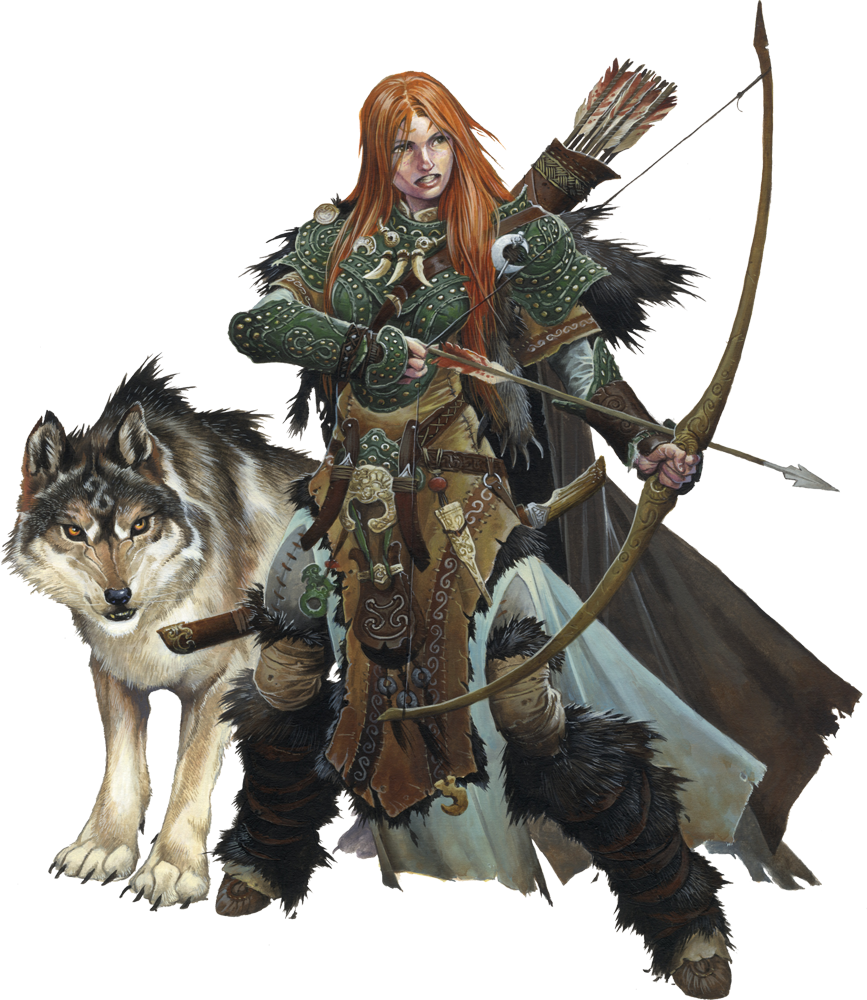

A ranger can use a variety of weapons and is quite capable in combat. His skills allow him to survive in the wilderness, to find his prey, and to avoid detection. He also has special knowledge about certain types of creatures, which makes it easier for him to find and defeat such foes. Finally, an experienced ranger has such a tie to nature that he can actually draw upon natural power to cast divine spells, much as a druid does.
Requirements

To qualify to become a Ranger, a character must fulfill all the following criteria.
- Not Applicable:
Class Skills

The class skills of the Ranger are:
- Climb
- Concentration
- Craft: Alchemy
- Craft: Armorsmithing
- Craft: Tailoring & Leatherwork
- Craft: Trap & Contraption Making
- Craft: Weaponsmithing
- Craft: Woodworking
- Heal
- Hide
- Jump
- Knowledge: Geography
- Knowledge: Dungeoneering
- Knowledge: Nature
- Listen
- Lore
- Move Silently
- Parry
- Profession: Cook
- Profession: Fisher
- Profession: Miner
- Profession: Woodcutter
- Search
- Set Trap
- Spot
- Survival
- Swim
- Use Rope
Class Features

Base Attack Bonus Progression: High
High Saves: Fortitude and Reflex
Skill Points at Each Level: 6 + Int modifier, x4 at first level
Hit Dice: D10
Weapon and Armor Proficiency: The Ranger is proficient in the use of all simple and martial weapons, light and medium armor, and shields (except for tower shields).
Spells: Beginning at 4th level, a ranger gains the ability to cast a small number of divine spells, which are drawn from the ranger spell list. A ranger must choose and prepare his spells in advance. To prepare or cast a spell, a ranger must have a Wisdom score equal to at least 10 + the spell level (Wis 11 for 1st-level spells, Wis 12 for 2-level spells, and so forth).
Track: A ranger has the ability to find and read tracks, but he moves slowly when doing so.
Favored Enemy: At 1st level, a ranger may select a type of creature as his favored enemy. The ranger gains a +1 bonus on Bluff, Listen, Spot, and Taunt checks, and also a +1 bonus on weapon damage rolls against their favored enemy. At 5th level, and every five levels after that, the ranger can choose an additional favored enemy and gains +1 to all favored enemy bonuses.
Combat Style: At 2nd level, a ranger must select one of four combat styles to pursue: archery, two-weapon, two-handed, or natural weapon combat. When a ranger selects a combat style they gain access to the feats granted by the style even if he does not have the normal prerequisites for that feat. These feats are granted at 2nd, 6th, 11th, 14th, and 18th level. The benefits of the ranger’s chosen style apply only when he wears light or no armor. He loses all benefits of his combat style when wearing medium or heavy armor.
Toughness: At 3rd level the ranger gains Toughness as a bonus feat.
Animal Companion: At 4th level, a ranger gains an animal companion.
Woodland Stride: Starting at 7th level, a ranger gains a +10% movement increase when in outdoor, natural environments.
Swift Tracker: At 8th level, a ranger can use their tracking skill and move at normal speed.
Evasion: At 9th level, a ranger can avoid even magical and unusual attacks with great agility. If he makes a successful Reflex saving throw against an attack that normally deals half damage on a successful save (such as a red dragon’s fiery breath or a fireball), he instead takes no damage. Evasion can be used only if the ranger is wearing light armor or no armor.
Camouflage: At 13th level the ranger does not suffer a movement penalty for using stealth mode when in outdoor areas.
Improved Evasion: At 16th level, a Ranger gains Improved Evasion. This functions as Evasion, except the Ranger only takes half damage on a failed save.
Hide in Plain Sight: A 17th level ranger has the ability to use the Hide skill even when being watched and in combat.
Bane of Enemies: At 20th level any weapon you wield against one of your favored enemies is treated as a bane weapon for that creature type (+2 to hit and it deals +2d6 damage).





